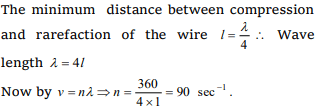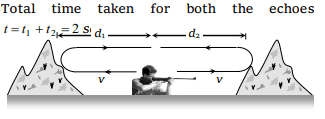1.Velocity of sound measured in hydrogen and
oxygen gas at a given temperature will be in the
ratio
a) 1 : 4
b) 4 : 1
c) 2 : 1
d) 1 : 1
Explanation:

2.Find the frequency of minimum distance between
compression & rarefaction of a wire. If the length
of the wire is 1m & velocity of sound in air is 360
m/s
a) 90 \[sec^{-1}\]
b) 180 \[sec^{-1}\]
c) 120 \[sec^{-1}\]
d) 360 \[sec^{-1}\]
Explanation:

3. It takes 2.0 seconds for a sound wave to travel
between two fixed points when the day
temperature is \[10^{\circ}C\] . If the temperature rise to
\[30^{\circ}C\] the sound wave travels between the same
fixed parts in
a) 1.9 sec
b) 2.0 sec
c) 2.1 sec
d) 2.2 sec
Explanation:

4. If vm is the velocity of sound in moist air, vd is the
velocity of sound in dry air, under identical
conditions of pressure and temperature
a) \[v_{m}>v_{d}\]
b) \[v_{m}< v_{d}\]
c) \[v_{m}=v_{d}\]
d) \[v_{m}v_{d}=1\]
Explanation:

5. A man, standing between two cliffs, claps his
hands and starts hearing a series of echoes at
intervals of one second. If the speed of sound in
air is 340 m \[s ^{-1}\] , the distance between the cliffs is
a) 340 m
b) 1620 m
c) 680 m
d) 1700 m
Explanation:


6. A source of sound of frequency 600 Hz is placed
inside water. The speed of sound in water is 1500
m/s and in air is 300 m/s. The frequency of sound
recorded by an observer who is standing in air is
a) 200 Hz
b) 3000 Hz
c) 120 Hz
d) 600 Hz
Explanation: Frequency of sound does not change with medium, because it is characteristics of source.
7.If the temperature of the atmosphere is increased
the following character of the sound wave is
effected
a) Amplitude
b) Frequency
c) Velocity
d) Wavelength
Explanation:

8.An underwater sonar source operating at a
frequency of 60 KHz directs its beam towards the
surface. If the velocity of sound in air is 330 m/s,
the wavelength and frequency of waves in air are:
a) 5.5 mm, 60 KHz
b) 330 m, 60 KHz
c) 5.5 mm, 20 KHz
d) 5.5 mm, 80 KHz
Explanation:

9.Two sound waves having a phase difference of
60° have path difference of
a) \[2\lambda\]
b) \[\lambda/2\]
c) \[\lambda/6\]
d) \[\lambda/3\]
Explanation:

10. It is possible to distinguish between the
transverse and longitudinal waves by studying the
property of
a) Interference
b) Diffraction
c) Reflection
d) Polarisation
Explanation: Interference, diffraction and reflection occurs in both transverse and longitudinal waves. Polarisation occurs only in transverse waves.